
Half an hour of meditation is essential, except when one is very busy. So one hour is necessary e”. This is the advice that Saint Francis de Sales gave, in the form of a joke, to one of his Philothies and he reflects well the primacy of prayer in his life and in all life Christian. He knew how to give excellent advice in this area, because he had experienced it himself. the importance of prayer in his life as a young Christian, priest and bishop. He will say in a sermon for the 4th Sunday of Lent: ” Who can and who should pray? All men can pray and all must do it. Only the devil cannot pray, because there is only he alone who is incapable of love .”
This is well said, prayer is a matter of love and only of the love of God. Francis will say it very loudly in his heroic act of abandonment in Paris, following the painful crisis he has lived, believing himself predestined to damnation by the infallible judgment of God. He wrote this prayer of which here is the conclusion: Anyway, Lord, for the least that I love you in this life, if I cannot love you forever “. May the love of God received in prayer animates every moment and every gesture A fruitful life Still during his studies in Paris, Father de la Rivière, one of his first biographers, tells a charming anecdote that reveals the candor of François’ soul: ” Being, says François, a young schoolboy in Paris, I had such a passion and desire to be perfect that I began to realize certain fantasies: I thought that to achieve holiness, it was necessary fold my head on my shoulder while saying my breviary, as did another schoolboy, who was really very virtuous. And that’s what I did for a while, but without becoming more perfect “.
Since then, continues his biographer, and throughout his life, he has energetically fled this an outward grimace that looked more like bigotry than real devotion! (see Humor and holiness in François de Sales, Father Gilles Jeanguenin). And one evening in January 1587, François, returning from school entered the Dominican church in Paris and immediately went continue to prostrate at the feet of Notre Dame de Bonne Deliverance, the Black Madonna of Paris. Humbly prostrate, he opens his heart in the presence of God and takes a tablet hanging from the baluster of the chapel on which is written the prayer to Mary of Saint Bernard which ends thus: “O Mother of the Incarnate Word, do not do not despise my prayer… Grant it!” this prayer (cry), springing from the depths of his heart, the temptation to despair vanishes. So in grateful love he surrendered his life, body and soul into the hands of God and Mary and took the decision to recite the Rosary every day. Here is this last advice to Madame de Travernay, who has many occupations in connection with her status of woman of the world: ” You should measure the length of your prayers by the amount of your affairs and since it has pleased Our Lord to put you in a kind of life in which you are perpetually distracted, you must accustom yourself to making short prayers; but that you never leave them without great necessity .”
And regarding distractions in prayer, Francis in is very conscious and realistic. Here is this little experience lived during the visits of his diocese. One day, he meets a brave peasant who tells him with conviction and pride: ” Monsignor, I am able to recite the Our Father without having distractions “. François tells him to try and if he succeeds, he will give him his horse. The brave peasant begins the prayer very seriously, then in the middle, he stops and asks the surprised bishop: ” Monsignor, is it that with the horse I will also have the saddle ?” A big burst of common laughter follows… Other advice concerns how to live the time of prayer. To Madame de Granieu, in 1618, François will write: “Do not amuse yourselves at the time of the prayer, to want to know what you do and how you pray; because the best prayer or oration is the one that holds us so well employed in God, that we do not think of ourselves, nor of what we do. In are, you have to go there simply, in good faith and without art, to be with God, to to love him, to unite with him. True love has no method…” Here is this last advice to Madame de Travernay, who has many occupations in connection with her status of woman of the world: ” You should measure the length of your prayers by the amount of your affairs and since it has pleased Our Lord to put you in a kind of life in which you are perpetually distracted, you must accustom yourself to making short prayers; but that you never leave them without great necessity .” And regarding distractions in prayer, Francis in is very conscious and realistic. Here is this little experience lived during the visits of his diocese. One day, he meets a brave peasant who tells him with conviction and pride: ” Monsignor, I am able to recite the Our Father without having distractions “.
François tells him to try and if he succeeds, he will give him his horse. The brave peasant begins the prayer very seriously, then in the middle, he stops and asks the surprised bishop: ” Monsignor, is it that with the horse I will also have the saddle ?” A big burst of common laughter follows…